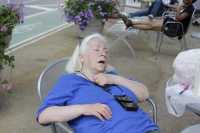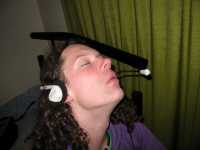MedicalResearch.com Interview with:
David C. Brodner, M.D.
Founder and Principle Physician
The Center for Sinus, Allergy, and Sleep Wellness
Double Board-Certified in Otolaryngology (Head and Neck Surgery)
and Sleep Medicine
Assistant Clinical Professor
Florida Atlantic University College of Medicine
Medical Director, Good Samaritan Hospital Sleep Laboratory
Senior Medical Advisor, Physician’s Seal, LLC®
MedicalResearch.com: What is the background for this study?
Response: Chronic disorders of sleep and wakefulness affect an estimated 50-70 million adults in the United States. The cumulative long-term effects of sleep loss have been associated with a wide range of damaging health consequences, including obesity, diabetes, impaired glucose tolerance, cardiovascular disease, hypertension, anxiety and depression.
In terms of preventing health consequences, sleeping 6-8 hours per night consistently may provide optimal health outcomes.
Comprehensive data from two recently completed patient-reported outcomes (PRO) studies provide further evidence of the observed hypnotic effects of REMfresh, demonstrating statistically significant improvements in sleep onset, sleep duration, sleep maintenance and sleep quality. PRO studies of this kind, which more closely address real-world patient experience, are increasingly being recognized by regulatory authorities and academia in evaluating new therapies. In addition to the traditional randomized, placebo-controlled trial studies, regulatory authorities are now incorporating the patient perspective in their decision making, including PRO studies. A PRO study is a measurement based on a report that comes directly from the patient about the status or change in their health condition and without amendment or interpretation of the patient's response by health-care intermediaries. PRO measures can be used to capture a patient's everyday experience outside of the clinician's office, and the effects of a treatment on the patient's activities of daily living. Together, clinical measures and PRO measures can provide a fuller picture of patient benefit.
REMfresh, the first and only continuous release and absorption melatonin (CRA-melatonin) formulation, is designed to give patients up to 7 hours of sleep support. It is a clinically studied, drug-free, nonprescription, #1 sleep doctor-recommended melatonin sleep brand.
(more…)




























